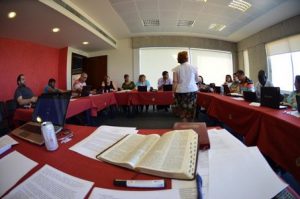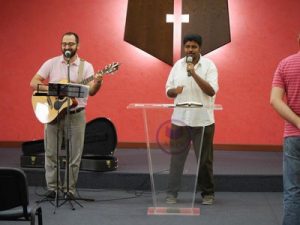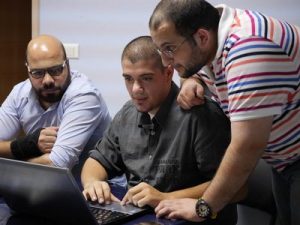Middle East (MNN) — Every project needs a base of operations. Participants need training, equipment, and directives before they can go out into the field and do the work they came to do.
It turns out missions aren’t that different. Arab Baptist Theological Seminary (ABTS) is the base of operations for many Christian leaders in the Middle East, says President Elie Haddad; a place where they can receive their own training and tools before they go back into volatile regions to spread the good news of the Gospel to their neighbors.
ABTS isn’t new to this game. “We have been around since 1960, and we were founded by American missionaries to train leaders for the Church in Lebanon, Jordan, and Egypt,” Haddad says.

(Photo courtesy of Arab Baptist Theological Seminary)
However, that doesn’t mean they haven’t picked up a few new tricks. Now, they focus on the entire Arab world, from North Africa up across the Middle East.
But their roots in Lebanon are what make them a safe haven and launch pad for pastors and leaders. “Because of the freedom we have in Lebanon, we can do things that do not happen elsewhere in the Arab world, so we feel that we have a burden and responsibility to the Church in the entire Arab world,” Haddad explains.
The target region is large and dangerous. Although there is an extremely active Church in the Middle East, ABTS graduates are ministering in areas where they face nationalism, conflict, violence, religious radicalization, mass displacement, ethnic tension, atheism, and more.
The Church that is in place can struggle with fear. As Haddad puts it, “Our churches in the region have grown up in a majority non-Christian world, so in this context, churches tend to be more ‘survival mode,’ just looking inwards.”
That’s why ABTS is challenging the Church to reach out to others instead of only ministering to those within an inner circle.

(Photo courtesy of Arab Baptist Theological Seminary)
But on top of everything, ideals ranging from extremism to nationalism are on the rise, and Haddad believes the Middle East is starting to think like Western civilization.
“That does not mean the theological curriculum that used to be relevant three centuries ago in the West can be relevant to the Church in Muslim countries today,” Haddad says. Although he still believes Scripture to play a crucial role in any believer’s life, he says Western challenges and engagement methods simply don’t work in the Middle East.
That’s why ABTS is concentrating on more than just filling students with theological knowledge; they’re teaching application.
“We equip them to know, we equip them to have a different passion and grow in their leadership and their spiritual life, and we equip them in skills as well so that we have holistic leaders who are able to understand their context and see what God is doing in the middle of the mess that we live in,” Haddad says. “We help them become transformative agents so their churches can make an impact too.”
But none of it can happen without your prayer and support. ABTS is limited in their financial resources and manpower, and they’re asking you to pray for wisdom and safety as they navigate those limitations.

(Photo courtesy of Arab Baptist Theological Seminary)
They’re also looking for partnership. “There’s no way that we can do what we’re called to do on our own without the Body of Christ,” Haddad says. “At the same time, the Western Church cannot reach the Arab Muslim world without us training local leaders for that kind of [work].”
Safety is a very real concern as many of these leaders head home. “Pray more for our students and our graduates,” Haddad says. “They are the ones that go back and serve God in difficult circumstances. We get to do what we’re doing in relative safety.”
Most of all, “Pray for the churches in our region so that we learn how to maintain a prophetic voice so we can have a bold witness despite what happens around us,” says Haddad, “[Emerging church communities] are finding new interest in Scripture, and this is a very unique time for the Middle East.”
